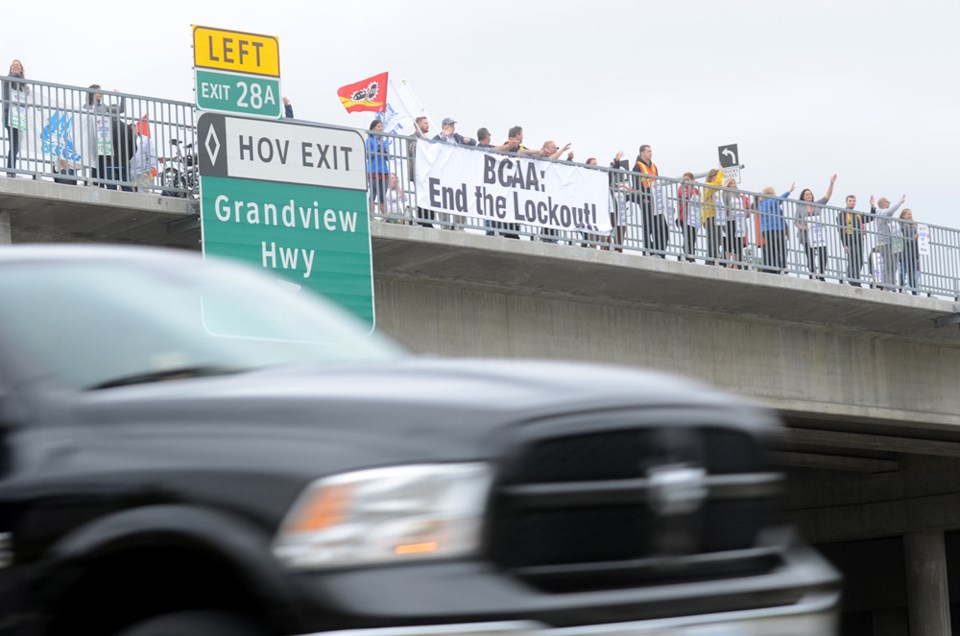BCAA tow truck dispatchers rallied together on Wednesday morning along the Willingdon Avenue highway overpass, two months after being locked out by the company.
The lockout occurred after contract negotiations between COPE Local 378 and the British Columbia Automobile Association stalled.
The rally, which was held between 7:30 and 9 a.m., was attended by about 45 union members, according to Gwenne Farrell, acting president of COPE 378 and one of the local’s vice-presidents.
“It went extremely well,” she said. “We had support from several other unions.”
Negotiations have not moved forward, according to Farrell, who said the union’s chief negotiator has been communicating with the B.C. Labour Board during the dispute.
“We have been back at the table, we’re not seeming to make any progress at this point,” she said. “I can tell you that COPE 378 members at BCAA want to return to their jobs, they love the work that they’re doing, they don’t want to be on a picket line, they would rather be serving the members at BCAA.”
It is unclear at this point whether negotiations will move forward any time soon, she added.
“We don’t know where things are going to go, but what we would like to see, and one of the things we’ve been saying all along, is that we want a fair and equitable collective agreement for our members,” Farrell said.
The dispatchers’ contract expired last September. Throughout the bargaining process, members held two strike votes – one in January, with members voting 94 per cent in favour of a strike, and one on May 25, with members voting 79 per cent in favour of strike action. The union issued strike notice on May 29, and shortly after that, tensions between the two parties grew. The company locked out approximately 70 employees on June 8.
The company commenced with the lockout over concerns that services to BCAA members were being affected by the dispute, Brenda Lowden, BCAA vice-president and chief people officer, told the NOW in June.
“We saw evidence of some disruptive activity,” she said. “So when that happens, our service is first and foremost paramount to our members. They need to know that they’ll continue to get the service that they expect. And if we see any evidence of that not being able to be delivered, we felt we had to take action.”
The primary issue between the two parties is compensation. According to the union, employees of BCAA’s car sharing company, EVO, who do similar tasks, work 35 hours a week and are paid the same wages as the COPE 378 members, who work 40 hours a week.
The union recently had a labour board decision go in its favour, regarding student employees.
The seven summer students, who were to start working in the unionized department as of June 2, were told by the company that they would not have positions with the department due to the labour dispute, according to the ruling. The students were then offered positions as clerks elsewhere within BCAA instead. The students accepted.
The labour board found the company had terminated the students from positions within the bargaining unit in an attempt to “disempower the union by preventing the students from being available to participate in the union’s lawful activities.”
The company was ordered to reinstate the students as employees of the unionized department.
“Each summer, BCAA hires students to provide them with employment and work experience to help build their careers. This year, seven of the 30 students we hired were for roles in the Road Assist Contact Centre,” Lowden said in an emailed statement. “When the union gave strike notice, we gave those students the choice to stay at RACC and participate in union action or to take on other jobs within the organization. They unanimously chose to accept alternative roles, some of which were within other unionized BCAA offices. We have been forced to remove the students from the job opportunities they chose and we’re disappointed that these students have been disadvantaged. We have applied for reconsideration in order to allow the students to gain the work experience they are seeking.”
Management is currently covering all the road assistance calls and dispatching drivers as needed, she told the NOW previously.



